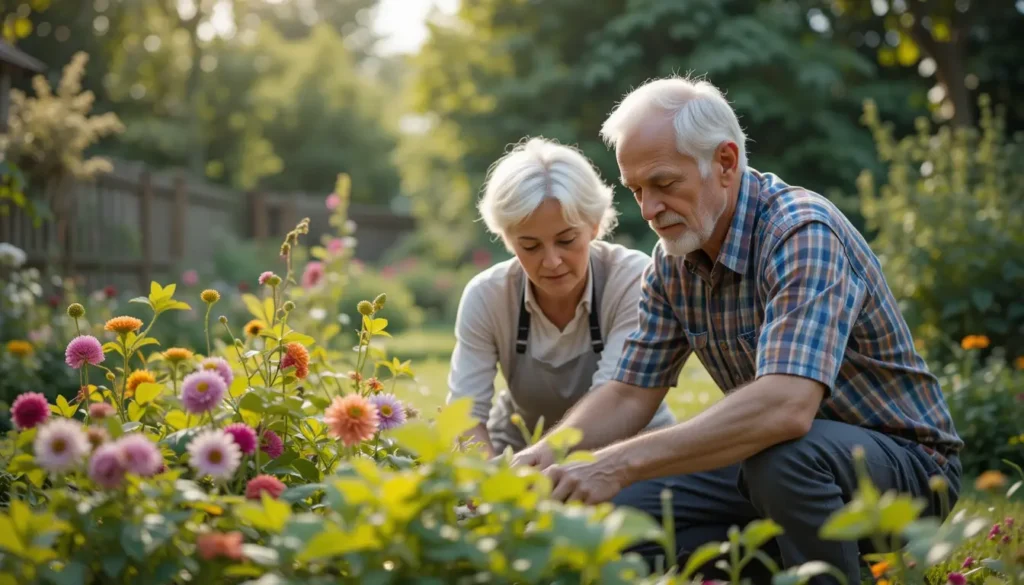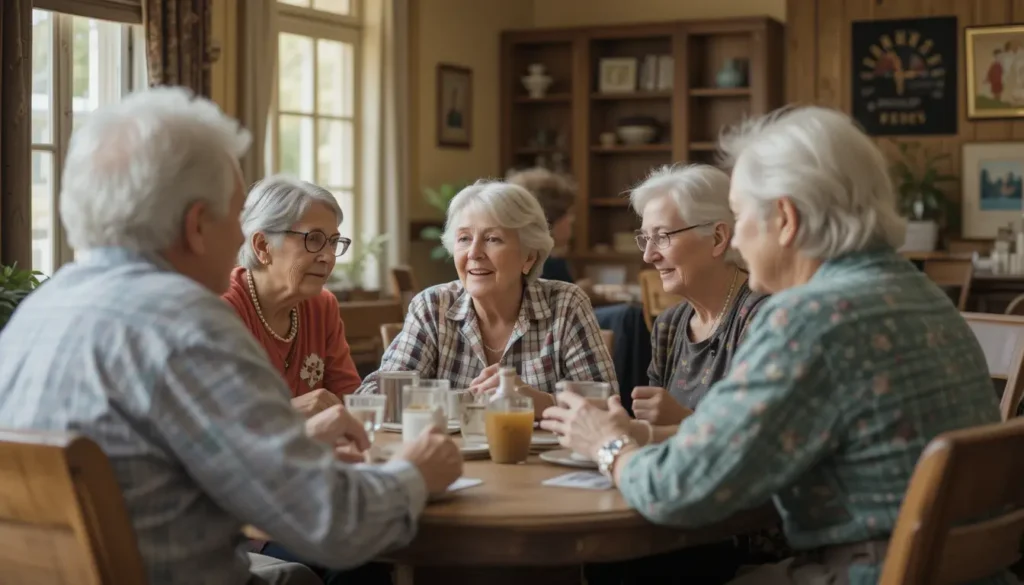Have you noticed how the sun makes everything feel alive? For seniors, a sunny day can be more than just bright and warm. It is a chance to get outside, move gently, and enjoy gardening in ways that support your body and mind.
Some tasks are safe, simple, and full of health benefits. Imagine spending a morning outdoors, feeling your hands in the soil, noticing flowers bloom, and knowing your efforts matter. Today, we will explore how to make the most of sunny days with gentle gardening that suits your pace and energy.
Why Gardening is Helpful for Seniors
Gardening is more than a hobby. It is a way to stay active, connect with nature, and feel accomplished. For seniors, even small movements can improve strength, balance, and flexibility. Regular activity in the garden helps maintain joint mobility and can reduce stiffness. Spending time outside also lifts your mood and supports mental health.
Many seniors avoid gardening because they worry about bending, lifting, or exposure to the sun. These concerns are real, but they can be managed with simple planning and smart choices. For example, using raised garden beds or containers allows you to plant without bending deeply.
Lightweight tools reduce strain on your hands and wrists. Wearing a hat and sunscreen keeps you safe under the sun.
Small actions in the garden, such as watering plants, pruning leaves, planting seeds, or harvesting herbs, provide gentle movement. These activities count as exercise but do not overwork your muscles or joints. Even short gardening sessions contribute to better circulation and increased energy levels.
Gardening also gives a sense of achievement. Watching a plant grow from seed to bloom or seeing vegetables ready to harvest is rewarding. Each task shows visible results, giving satisfaction that strengthens confidence and encourages more activity.
Beyond the physical benefits, gardening keeps your mind engaged. Planning where to plant, remembering watering schedules, and noticing subtle changes in plants stimulate cognitive skills. The combination of movement, focus, and nature exposure makes gardening uniquely beneficial for seniors.
In the next sections, we will explore the best gardening tasks for gentle activity, the tools that make them easier, and tips to make gardening safe, enjoyable, and deeply satisfying. By following these steps, sunny days can become a time of growth, joy, and wellness.
Planning Your Gardening Session
Before stepping outside, take a moment to check your energy level and the weather. Choose a time when the sun is warm but not harsh, usually in the morning or late afternoon. Dressing appropriately protects your skin and keeps you comfortable.
Wear a wide-brimmed hat, light clothing, and sunscreen. Sunglasses can protect your eyes from bright sunlight. Keep a water bottle nearby to stay hydrated, especially on hot days. Small steps like these prevent fatigue and help you enjoy your time outdoors safely.
Plan gardening sessions to last between 20 and 40 minutes. Short sessions prevent overexertion and make it easier to maintain a regular routine. Take breaks as needed. Sit in the shade, rest your arms and legs, and enjoy the sights and smells of your garden.
Using a chair, stool, or kneeling pad reduces the need to bend or kneel, protecting your back and knees. Raised garden beds or container gardens further reduce strain while keeping plants within easy reach.
Dividing your garden into sections makes work manageable. Focus on one area per session rather than trying to do everything at once. Completing a section gives you a sense of accomplishment and makes progress visible. You will notice flowers, herbs, or vegetables thriving because of your care, which adds motivation for the next session.
Consistency is key. Regular, gentle gardening builds routine, improves physical stamina, and maintains cognitive engagement. Planning sessions this way encourages more outdoor activity and strengthens both body and mind. By preparing carefully and pacing yourself, gardening becomes a safe, enjoyable, and deeply rewarding experience for seniors.
Gentle Tasks That Support Health
Gardening offers many tasks that are gentle, safe, and beneficial for seniors. Each activity provides physical movement, mental focus, and a sense of accomplishment. By choosing tasks that match your energy and strength, you can enjoy gardening without strain or fatigue.
Watering and Mist Spraying
Watering is simple but essential for healthy plants. Using a lightweight watering can or a hose with a gentle spray reduces strain on your arms and shoulders. Early morning is the best time to water because the air is cooler, reducing the risk of sun discomfort and keeping you refreshed.
Mist spraying adds an extra layer of enjoyment. Watching droplets settle on leaves and petals stimulates your senses. The gentle sound and feel of water on your hands and plants can be calming and soothing. To make this task easier, place containers at waist height and use a watering can with a soft grip.
Planting Seeds and Small Plants
Planting is rewarding and low impact. You do not need heavy lifting, especially if you use containers, raised beds, or pots. Seeds and seedlings are light and easy to handle, making this task accessible for most seniors. Planting encourages hand coordination, fine motor skills, and focus.
Take your time arranging seeds, filling soil, and spacing plants properly. Watching tiny seeds sprout into healthy plants over days and weeks provides a sense of progress and accomplishment. Use tools such as small trowels, scoops, or seed trays to reduce bending and effort.
Pruning and Deadheading
Pruning and deadheading are simple tasks with big benefits. Removing dead leaves or flowers helps plants grow healthier and improves the appearance of your garden. Use small pruning shears with ergonomic handles to protect your hands and wrists.
Work slowly and deliberately, taking breaks as needed. Each cut you make supports the life of the plant while giving you a quiet sense of purpose. This task can also become a mindfulness activity, as you focus on details and notice changes in plants over time.
Harvesting Vegetables or Herbs
Harvesting is one of the most rewarding gardening tasks. Picking vegetables and herbs gives immediate results for your effort. You see the fruits of your work and feel satisfied with your accomplishments. To make this task gentle on your body, keep baskets or containers at waist height. This prevents bending or stooping, which can strain your back or knees.
Harvesting encourages gentle movement, hand coordination, and careful focus. It also promotes healthy eating, as fresh herbs and vegetables can be enjoyed right away. Take your time and notice the colors, textures, and aromas of what you pick. This sensory engagement adds calm and joy to the activity.
Light Soil Maintenance
Maintaining soil health can be done without heavy work. Tasks such as loosening soil with a hand fork, turning compost, or removing weeds can be gentle when done in short intervals. Sit or kneel on a cushion or small stool to protect your knees and lower back.
Stretch your fingers, wrists, and arms before starting to prevent strain. These small movements improve flexibility and hand strength. Work slowly, take breaks, and rotate tasks to avoid fatigue. Maintaining soil not only benefits your plants but also provides low-impact exercise that supports your overall wellness.
Adding Fun and Safety
Gardening is most enjoyable when it is safe and thoughtfully planned. Schedule short breaks in the shade and drink water regularly to stay hydrated.
Play soft music or invite a friend to share the experience, adding social connection and relaxation. Wear gloves to prevent scratches, irritation, or contact with soil bacteria. Rotate gardening tasks so you do not overuse one part of your body.
Pay attention to small details in your garden. Notice how leaves move in the wind, how insects visit flowers, or how the sun warms the soil. Observing these subtle changes keeps your mind alert, curious, and present. Each moment outdoors becomes an opportunity for sensory enjoyment, mental relaxation, and emotional satisfaction.
The combination of movement, focus, and nature engagement makes gardening both safe and fulfilling for seniors.
Benefits of Gentle Gardening for Seniors
Gentle gardening offers a combination of physical, mental, and emotional rewards that can transform your daily life. Physically, it strengthens muscles, improves flexibility, and supports balance without overexertion.
Tasks such as watering, planting, and pruning engage arms, hands, and core muscles in a safe way. Even light movements like reaching for a plant or turning soil stimulate circulation, helping joints stay mobile and reducing stiffness. Over time, these small actions build endurance and protect mobility, making everyday tasks easier and safer.
Mentally, gardening helps calm the mind and improve focus. Planning where to plant seeds, remembering watering schedules, and observing plant growth stimulates attention and cognitive function.
Each task requires thought and patience, providing gentle mental exercise that keeps your mind sharp. Watching seedlings sprout and flowers bloom provides immediate feedback and a clear sense of accomplishment. This sense of progress releases positive feelings that increase motivation and confidence.
Spending time outdoors adds further benefits. Sunlight increases vitamin D absorption, which supports bone health, immunity, and mood regulation. Fresh air and gentle activity help lower stress and reduce feelings of anxiety.
Observing your garden—the way leaves sway, birds visit, or flowers open—brings sensory engagement that encourages mindfulness and emotional well-being.
Gardening also fosters a sense of purpose and pride. Knowing that your care directly affects the growth and health of plants creates satisfaction and meaning.
Repeated gardening sessions build routine, confidence, and consistency. Each sunny day becomes an opportunity to connect with nature, your body, and your own sense of achievement.
When done gently, gardening becomes more than an activity. It transforms into a source of health, relaxation, joy, and personal growth. Every small task, from planting a seed to harvesting herbs, contributes to a rhythm that keeps your energy, curiosity, and mood alive.
The cumulative effect is profound: a body that moves safely, a mind that stays engaged, and a heart that experiences calm and pride. Gentle gardening allows seniors to enjoy the outdoors fully while nurturing both plants and themselves.
With proper planning, gardening is safe, easy, and rewarding for seniors. Simple tasks, short sessions, and proper tools keep the activity gentle. Each step outdoors brings health, happiness, and engagement with nature. Your garden reflects your care, effort, and presence.
Start small, observe results, and celebrate accomplishments. Over time, gardening becomes a daily habit that nourishes body and mind. Sunny days will no longer pass unnoticed. Instead, they will be opportunities to grow, move, and enjoy life with every gentle task in your garden.




